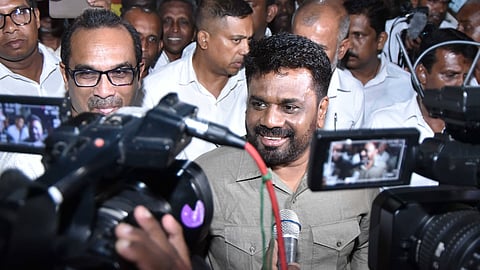State of Southasia #10: Ambika Satkunanathan on Anura Kumara Dissanayake’s win and the landmark political shift in Sri Lanka
In 2019, Anura Kumara Dissanayake contested Sri Lanka’s presidential election against the incumbent Gotabaya Rajapaksa. He won only three percent of the vote. In the parliamentary elections a year later, the National People’s power – the coalition that includes Dissanayake’s party, the Janata Vimukti Peramuna – won only three seats. The JVP was disparaged as the “three percent party.” In 2024, Dissanayake has turned the tables by winning 42 percent of the vote share. Meanwhile, Namal Rajapaksa, the son of former president and prime minister Mahinda Rajapaksa, secured only 2.57 percent.
Dissanayake’s meteoric rise to Sri Lanka’s executive presidency, which marks a landmark shift in the country’s politics, was powered in large part by the people’s struggle or Aragalaya in 2022 and the simmering public dissatisfaction with the political class ever since. The hardship brought on by Sri Lanka’s economic collapse brought people out on the streets in the summer of 2022. They were disillusioned with the dynastic politics and corruption in the political establishment. The movement unseated Mahinda Rajapaksa as prime minister and Gotabaya Rajapaksa as president. Ranil Wickramesinghe who took over as president managed to stall the economic free fall but failed to address the hardships of the majority of the population and remained unpopular as a member of the reigning political class. Dissanayake, on the other hand, spoke the language of the aragalaya, promising an end to corruption and the establishment of the new political culture.
In this episode of State of Southasia, Ambika Satkunanathan, a lawyer and former commissioner of human rights in Sri Lanka, explains how sections of the populace, including the Tamil minority, are wary of Dissanayake, given the JVP’s history of violent insurrections in the 1980s and its leftist economic outlook. However, she says, he has made the right moves in reaching out to business communities and showing an eagerness to work with everyone.
State of Southasia releases a new interview every four weeks.
This podcast is now available on Soundcloud, Spotify, Apple podcasts and Youtube.
Clarification: This page earlier stated that Namal Rajapaksa's vote share in the 2024 Sri Lankan presidential election was three percent, a rounded figure. Rajapaksa's exact vote share was 2.57 percent. The text has been updated with the exact figure.
Episode notes
Further reading from Himal’s archives:
Sri Lanka enters a presidential election like no other before it
How Ranil Wickremesinghe became Sri Lanka’s unlikely repairman
The deep roots of Sri Lanka’s economic crisis
Sri Lanka continues to militarise the state, despite the Rajapaksas’ fall
Sri Lanka’s local elections are a major threat to the ruling class
Notes on the Sri Lankan struggle
Sri Lanka’s complex dance of Sinhala and Tamil nationalist politics
Tamil politics in Sri Lanka after R Sampanthan, the elder statesman that never was
The devastating poetry of Tamil women who fought in Sri Lanka’s civil war
State patronage and geopolitics are strange bedfellows for Sri Lanka’s literary and art festivals
Sign up for Himal’s newsletters here to get updates on our latest podcasts.

